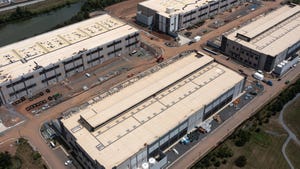Switch Gets All A’s, Four Providers Fail Green Data Center Test by GreenpeaceSwitch Gets All A’s, Four Providers Fail Green Data Center Test by Greenpeace
Latest report card on the tech sector’s renewable energy efforts is out

The green data center report cards are in, and not all data center providers will be proud to show theirs to parents.
Greenpeace gave four out of 14 data center and CDN service providers overall failing grades for efforts to clean up the energy mix that powers their data centers. One of the four is an American company – DuPont Fabros Technology – and three are Korean: Korea Telecom, LG, and SK.
The environmental activist organization rewarded the efforts of Las Vegas-based Switch with an A (the only A on the list), while Silicon Valley-based colocation giant Equinix received a B, and San Francisco’s Digital Realty Trust is bringing home a C.
Greenpeace publishes its Clicking Clean report periodically in an effort to pressure the biggest data center operators and users – companies responsible for building much of the internet infrastructure – to source renewable energy for their facilities, invest in renewable energy generation, and use their influence as big energy customers with utilities and regulators to bring more renewable energy on the grid and make it easier to obtain.
Data centers in the US collectively consumed 70 billion kilowatt-hours of electricity in 2014 or 2 percent of the country's total energy consumption, according to the latest data available from the US Department of Energy. Growth of the industry's overall energy consumption has slowed down substantially, due primarily to gains in energy efficiency.
Read more: Here's How Much Energy All US Data Centers Consume
In recent years the price of renewable energy has come down enough to make it at least competitive with coal energy, while more and more corporations have set renewable energy goals for their operations, boosting demand for renewables powering the data centers they outsource their IT infrastructure to. But while the current market environment is favorable for green data centers, the Greenpeace report warns, the incoming US presidential administration may slow that momentum, with President-elect Donald Trump having promised to “roll back climate policies and revive the use of coal.”
Read more: How Renewable Energy is Changing the Data Center Market
Because the incoming government will be hostile to efforts to combat climate change and at best agnostic on renewables, the advocacy portion of Greenpeace’s scoring system will become especially important, Gary Cook, the organization’s senior corporate campaigner and lead author of the report, said in an interview with Data Center Knowledge. “Advocacy in the coming years is going to be a more important thing,” he said. “Hopefully more companies will continue to step up.”
The scorecard for data center and CDN providers is one of nine scorecards in the report, grouping companies by the nature of their business. The report card that’s sure to attract the most attention is the one for the biggest cloud, internet, and IT companies, such as Amazon Web Services, Facebook, Google, Microsoft, Apple, Alibaba, Baidu, Oracle, and IBM. Google, Facebook, and Apple lead this pack, each receiving an A as the final grade. Tencent and Baidu are the two Fs on the list.
There are also separate scorecards for video and audio streaming services, messaging, search, social media, blogs, and e-commerce.
Switch, operator of the massive Switch SuperNAP data center campuses in Las Vegas that’s also building near Reno, Nevada, and outside of Grand Rapids, Michigan, appears in the report for the first time. The company has pledged to power 100 percent of its data center operations with renewable energy. It spent two years in court fighting for permission to leave utility NV Energy in Nevada so it can source renewables from other generators and secured a supply of renewable energy for its future Michigan campus.
Greenpeace praised Equinix for having been the first major colocation provider to commit to being 100 percent renewable, but said the company’s efforts to meet that goal to date have been subpar. The report criticized the company’s claim that its two wind energy deals in Texas and Oklahoma would make its entire North American operations renewable. It characterized the claim as “a significant step backwards, and far below best practice demonstrated by Switch, Apple, and other sector leaders who have deployed renewable electricity at a local or regional level for each facility.”
Cook acknowledged that Switch has a much smaller footprint than the likes of Equinix and Digital Realty, global players who need to procure a lot more renewable energy to power their operations.
We'll be doing more coverage of the report throughout the week.
About the Author
You May Also Like







